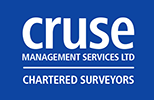When Cruse MS was formed in 2007, our vision was to develop a multi-disciplinary practice offering a range of ‘management services’ to the construction industry. Our core skills remain as chartered quantity surveyors, and construction cost managers offering our clients valuable cost advice on a variety of projects, and accounts. Our clients are as diverse as domestic home owners, main and sub contractors, commercial banks, property developers, utility companies and insolvency practitioners.
We are seeking to engage initially with an architect(s), and other construction professionals with a view to maximising the business opportunities which are created when we engage with our clients, and to offer our clients an ‘in house’ fully integrated design and cost management service.
If you are a small architects practice or freelance architect based in the North West of England, and are seeking an opportunity to develop your business, and can see the benefits of engaging with a chartered quantity surveyor to form a small multi disciplinary architectural and quantity surveying practice. Please contact Ian at our office on 01254 248557 for an informal conversation.
We envisage that initially both disciplines shall be self funding, and capable of generating their own work loads, The vision is to build on this solid foundation, and to grow the practice to fulfil our clients requirements.
All enquiries shall be dealt with in the strictest confidence.
